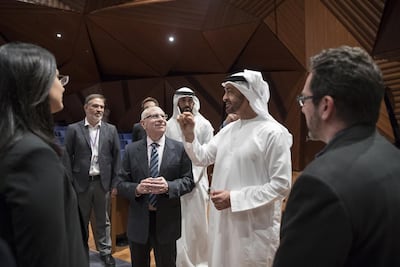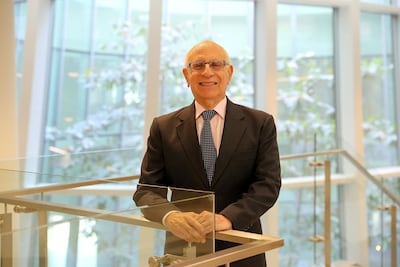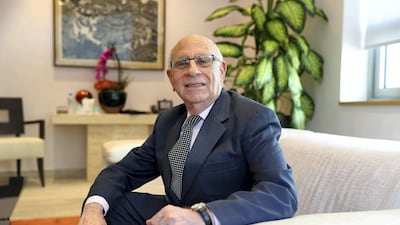Alfred Bloom was retired for just two days when he received the call.
It was the chance to be among the leadership of New York University, not in his native New York, but 11,000km away in Abu Dhabi.
That was the beginning of a remarkable journey for him and the seat of learning that today attracts more than 115 nationalities.
As the inaugural vice-chancellor of NYUAD announced he was stepping down as its top administrator next year, he sat down with The National.
“I feel it important to let you know now, so that the community has ample time to mount a comprehensive global search for the next vice chancellor and to offer him or her a comfortable time frame for transition here,” he said.
Dr Bloom was recruited in 2008 to lead the new Abu Dhabi campus immediately after announcing his retirement from Swarthmore College, the private liberal arts college in suburban Philadelphia where he served as president for 18 years.

“As my wife said, I was unemployed basically for about two days,” said Dr Bloom. He was contacted by then-NYU president John Sexton, who presented a vision for the proposed new university.
“He said, ‘I want you to establish a liberal arts college at the same level of intellectual seriousness and with the same commitment to social responsibility and with the same type of world recognition as Swarthmore had, but I want you to do something beyond that,’” said Dr Bloom.
“’I want you to place it in Abu Dhabi, in partnership with the Abu Dhabi Government. I want you to make it a totally global institution, which has the ability to stretch itself and students and the faculty across differences in the world and come to be able to bridge those differences and understand those differences in an important way for the future.’”
The pitch worked. It “caught my imagination as something really exciting and really important,” said Dr Bloom.
At the time, NYU Abu Dhabi was only beginning to take shape. The campus on Saadiyat Island was still in the conceptual stage, and construction work wouldn’t begin until 2010.
“We had no idea of where we would house students or faculty,” said Dr Bloom. “And, then, an apartment building grew called Sama Tower, and we said to the government, ‘Can we have that?’ And, a miracle, they said yes.”
Sama Tower, in the heart of Abu Dhabi, would serve as the temporary residence for students and faculty until 2014, when construction of the Saadiyat campus and residences were completed.
Most classes and campus activities those early years were held in a provisional Downtown Campus. Labs were set up in a dedicated building in Mussafah.
With the temporary facilities in place, Dr Bloom faced another challenge: how to convince the best and brightest students from around the world to join NYUAD for its inaugural year. The university had originally set a target of recruiting 100 students for its first freshman class. It received more than 9,000 applications and admitted 150 students from 39 countries for its introductory academic year in 2010.
______________
Read more:
NYUAD to host UAE's first space data centre
______________
"Al took on one of the most daunting, and yet one of the most exciting, tasks in higher education: the leadership of a campus that is being created where none existed before,” said NYU president Andrew Hamilton. “Most of us, when we step into a campus leadership position, can rely on established practices, traditions, and history to guide us. Not so, with Al and NYU Abu Dhabi. He not only had to lead the school, he had to be ever conscious that the decisions he, his team, and other colleagues back in New York made would begin to form the traditions, define its character, and help establish its place in the Abu Dhabi community. And his success was extraordinary.”
The student body has since grown to more than 1,200 undergraduate students – including 361 freshmen admitted this academic year – representing more than 115 nationalities. Emiratis now make up 15 per cent of the student population, compared with less than 1 per cent during the school’s first year of operation. The university has produced 10 Rhodes Scholars, including six Emiratis.
“Even in its infancy, NYU Abu Dhabi attracted excellent faculty and remarkable students, students who turned down some of the world's most prominent universities because they were drawn to the idea of a genuinely global education,” said Dr Hamilton. “And those students went on to win Rhodes scholarships, appointments to the top graduate and professional schools, and positions at leading companies and organizations.”
The Abu Dhabi Government continues to fully finance the university.
“There is tremendous and very generous funding by the Abu Dhabi government,” said Dr Bloom.
“I don’t know any government in the world that would even envision or actually implement a funding policy for a student body made up of so many students that aren’t from their own country.
_____________
Read more:
'It feels like home': how NYUAD is attracting students from Texas to Afghanistan
_____________
"It is a vision of international outreach, of global unity, of long-term understanding that every one of those kids is going to become an ambassador for the UAE and is going to take the learning and the vision that comes from the UAE with them when they go around the world. That model is just amazing and unprecedented.”
The university is also establishing its own development office, “so that we can share in that cost,” said Dr Bloom. “The more we can contribute, the more we’ll feel that there is a more just distribution of responsibility.”
Plans are also underway to double the number of faculty as NYUAD boosts its research capacity and gets ready to launch graduate programs within the next five to eight years.
Last year, the university employed 196 standing faculty, 37 affiliated and 40 visiting faculty. In 2017, the faculty published 95 research articles in the top academic journals tracked by the Nature Index. By comparison, the United Arab Emirates University published seven, the second-highest amount in the country. The UAE now ranks among the top 50 countries for high quality research output.

“It’s quite amazing what they have been able to do,” Dr Bloom said of the faculty. “What has happened is not only has the undergraduate student body lived up to every expectation in terms of every dimension that one would use to judge undergraduate program results, but the research of the faculty is totally impressive on world standards.”
Dr Bloom, 72, said the past 10 years have been a “phenomenal period in my life” but that “it is really the right time” for him to step aside.
“I think what we have accomplished as a university is really historic, but I think it’s very good to set an amount of time for any given leader of an institution so that they are always ready to bring in fresh perspectives and new richness to the leadership of the institution.”
Asked what he will miss most about Abu Dhabi, Dr Bloom said: “I’m going to miss the project immensely. What our students are accomplishing, how they are being transformed into these agents of global change and cooperation, to see this faculty producing research that’s really going to make a difference in health, a difference in environment, a difference in peace – it’s totally energizing.”
Symone Gamble, a social research and public policy graduate of the NYU Abu Dhabi class of 2014, said Dr Bloom is a “pioneer” who wholeheartedly believed in not only the potential of the university, but also of its students.
“I think the campus will miss Dr. Bloom’s warmth and joyful energy,” said Ms Gamble, 26, who works at Google in California. “Dr Bloom’s legacy reminds us that we can envision and build any dream we have.”

